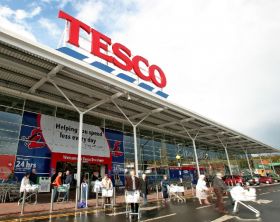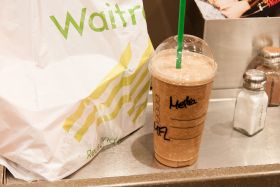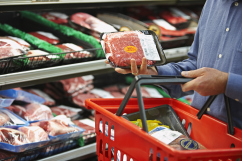Retailer news
Underlying profits for the first half of its financial year were £354 million, 55% down on the same period last year
Tesco has endured a further fall in profits.

Underlying profits for the first half of its financial year were £354 million, 55% down on the same period last year.
Its pre-tax profit was £74m, compared with a loss of £19m for the same period a year ago.
UK like-for-like sales were down 1.1% in the second quarter, an improvement from the first quarter’s fall of 1.5%. International sales were up 1%
In February, Tesco reported the worst results in its history, with a record statutory pre-tax loss of £6.4bn for the year to the end of February 2015.
Chief executive Dave Lewis said: “In the UK, we continue to improve all aspects of our offer for customers, resulting in volume growth which is allowing us to create a virtuous circle of investment.
“Our transformation programme in Europe has accelerated growth and reduced operating expenses, and in Asia, we have increased market share in challenging economic conditions.”
The supermarket is still under a criminal investigation by the Serious Fraud Office (SFO) after it admitted overstating its profits by £263m nearly a year ago.
Tesco’s Q2 results, David Gray, retail analyst at Planet Retail, said: “As expected, the numbers this morning indicate further signs of stabilisation at Tesco’s domestic unit, with like-for-like declines narrowing on those reported at Q1. There were also encouraging signs on volumes at Tesco, indicating this is a volume-led recovery.
“These figures have firmly cemented the split in the UK mid-market into two camps – Tesco/Sainsbury’s showing signs of recovery and Asda/Morrisons being the laggards. Considering Tesco was in the throes of the accounting scandal just 12 months ago, being in the former camp is an achievement in itself.
“Despite positive numbers in CEE, problems are persisting in Asia where like-for-likes remained flat in Q2 – an improvement, yes, but not stellar growth. Although Tesco’s Chairman has recently reaffirmed its commitment to the geographies in which it now trades, long-term disposals could still be on the cards considering the relative weakness in the company’s balance sheet and the lack of a dunnhumby sale.
“With Korea already culled, Malaysia is the obvious next market at risk with limited growth potential. However, it is profitable and well-established and so could command a decent price. In CEE, markets like Poland would generate the largest windfall considering its size relative to neighbouring markets and the presence of a string of international operators that could be would-be buyers. Most of these aforementioned markets look safe – for now at least.”
Asda, Iceland, Morrisons and Waitrose will donate money from new plastic bag levy to help fund new dementia research centre

In a rare instance of retailers working together, four of the UK’s major supermarkets have collaborated in a new charity initiative relating to the new “5p charge” on plastic bags
Asda, Iceland, Morrisons and Waitrose have pledged funds from the new levy to support the construction of a new dementia research centre at UCL university in London.
In addition to committing funds from their own stores, the four chief executives are today writing to their counterparts at all other UK food retailers, urging them to lend their support either this year or over the next five years.
With a total investment of £350 million, the proposed research centre currently has a funding shortfall of £100m, and the cash generated by carrier-bag sales in food retailers across Britain has the potential to bridge much of that gap.
The new centre aims to help the G8 Group challenge to find a cure for dementia by 2025.
Morrisons shop floor staff will now be paid £8.20 an hour, above the new national living wage of £7.20 after the review of salaries.
Morrisons has become the latest retailer to increase wages for shop-floor staff by bumping pay up to £8.20 an hour.

The pay rise, up 20 per cent from £6.83, will apply to staff of all ages and is well ahead of chancellor George Osborne’s new national living wage of £7.20, which comes into effect for over 25s in April of next year.
Morrisons said the increase is costing £40 million, and will include other changes such as removing extra pay for Sundays.
Chief executive David Potts said: “We have been listening to our colleagues who told us they want their pay to be more competitive and simpler.
“By paying a significantly higher hourly rate, we are recognising the contribution of our excellent staff, who are so important to the revival of Morrisons.”
The news comes as Lidl said it was the first UK supermarket to implement the new minimum wage as recommended by the Living Wage Foundation. Fom October, Lidl UK employees will earn a minimum of £8.20 an hour across England, Scotland and Wales, and £9.35 an hour in London.
This month Sainsbury’s also increased its standard rate for shop floor staff by four per cent to £7.36 an hour, the Guardian reported.
Gill Owen, from the Living Wage Foundation, said: “This is wonderful news from Morrisons. Lidl’s announcement has prompted a review of pay practices and it shows consumers are beginning to recognise that the living wage is an important market of a responsible business. We hope more will follow in Morrisons’ footsteps.”
Morrisons is initially running a trial at ten stores across the country, with full roll-out expected by February 2016
Morrisons is to take down sweets from its main-bank checkouts and replace them with fruit.

The move, which will be in full effect by February 2016, comes after the retailer sought the view of its customers.
Nuts and bottled water will also be offered in place of sweets, alongside fruit. Morrisons already offers alternatives to sweets at one in five of its supermarket checkouts.
To make sure the confectionery is replaced with items that customers want to buy, Morrisons is initially running a trial at ten stores across the country, where checkouts will be stocked with the new snacks, as well as magazines and bags for life. Action will be taken dependent on the results of the trial.
David Potts, CEO at Morrisons, said: “We have been listening to parents and guardians who have told us that sweets on checkouts can sometimes lead to pestering from their children. This change will make the trip through the checkout easier and less stressful.”
Bryonie Hollaert,Morrisons’ company nutritionist, said: “We are doing what we can to help customers choose healthier foods. As well as taking chocolate away from checkouts, we are also removing sugar and salt from other food and drink products. Last year alone we removed nearly one billion calories and over 38million teaspoons of sugar from our soft drinks.”
Retailer’s pre-tax profit falls by almost half in H2 as it prepares to close 11 supermarkets and finalise sale of M Local
Morrisons will close 11 supermarkets and sell 140 of its convenience shops after reporting that like-for-like sales fell by 2.7% in the first half of this year.

The six month results to 2 August also saw total turnover fall by 5.1 to £8.1 billion while pre-tax profit fell by almost 50 per cent to £126 million.
M Local convenience shops, in the process of being sold, will be re-branded as ‘My Local’ with the 2,300 staff kept on. An extra 200 jobs are to be created by reopening 10 shops that are currently closed, the BBC reported. They are understood to have been bought by convenience veteran and former Spar man Mike Greene, backed by investment firm Greybull, according to the Telegraph.
Chief executive David Potts said he expects profit to be higher in the second half of the year, but stressed that recovery will be “a long journey”.
“The immediate priority is to deliver a better shopping trip to stabilise trading performance. Our six strategic priorities will then deliver improvement in the core supermarkets, where we have the greatest opportunity,” he said.
“It will be a long journey. We approach the challenge with energy, confidence and many strengths, particularly our strong balance sheet and cash flow, which enables investment in improving the customer shopping trip.”
Morrisons also named two new non-executive directors – Belinda Richards and Irwin Lee.
Chairman Andrew Higginson said: “David has very quickly formed a new team that combines the best of Morrisons home grown and external talent. I am also delighted that two new non-executive directors – Belinda Richards and Irwin Lee – have recently joined and strengthened the board. They bring a wealth of experience, which will prove invaluable to Morrisons.
“During the first half, the team has made good progress in starting the turnaround journey. While the management team need time to settle in, make the changes they see as important, and build trading momentum, I believe the team will deliver much improved profits and returns for shareholders.”
Retailer reportedly ready to offload newly-launched convenience chain to investment firm Greybull Capital
Morrisons is set to sell its convenience arm M Local as chief executive David Potts continues his revamp of the struggling supermarket.

The retailer is said to be in “advanced talks” with investment firm Greybull Capital, which has previously rescued budget airline Monarch Airlines, the Telegraph reported.
It is understood that Greybull will provide tens of millions of pounds to fund the takeover and provide the stores with working capital, the paper said.
Morrisons has reportedly received a series of approaches for the convenience stores since earlier this year when it announced it would close 23 of the stores.
The M Local estate consists of over 150, generating between £250m and £350m in sales.
The retailer was later to the convenience market than rival offerings from other top four retailers, and analysts have said this led to it paying far higher rental costs for prime retail spots.
Until this Thai-sourced product launched, shoppers could only buy mature brown coconuts in UK supermarket aisles
Asda has launched ‘young coconuts’ into stores nationwide, receiving backing from one of the stars of ITV’s The Only Way Is Essex (TOWIE) in the process.

Until now, shoppers could only buy mature brown coconuts in UK supermarket aisles, but Asda’s younger model is hot off the heels of the the thirst for coconut water drinks.
Dubbed ‘nature’s Lucozade’ the young coconuts can reportedly help you rehydrate post-workout due to their isotopic properties: a property that TOWIE’s Ferne McCann took to Twitter to eulogise about to her 606,000 followers.
Unlike some pre-packaged coconut waters, Asda’s young coconuts have no added sugar, no additives, and no preservatives or artificial colours, sweeteners or other added nasties.
Supplied from growers in Thailand, the outer green flesh of the young coconut shell is shaved down for easy handling, and all shoppers have to do is chop off the top at home and stick in a straw.
Young coconuts differ from the more mature, brown and hairy coconuts we’re used to seeing on shelves as the insides are made of coconut water and a jelly-like flesh – the older they get, the darker the outer shell becomes and the inside of the coconut turns to hard white flesh with no water at all.
Fresh produce manager at Asda, Charlie Mills, said: “As Brits become increasingly interested in natural, clean hydration with no added extras we felt we needed to go right to the source and give shoppers the purest from of coconut water we can.
“Bottled versions are great for people on the go, but if you’re after coconut water in its purest form then an Asda young coconut is the nuts.”
‘Groundbreaking’ move allows customers who are members of my Waitrose to choose products they’d like to save 20% on

Waitrose is to start giving its customers the power to pick which groceries they save money on.
The ‘Pick Your Own Offers’ scheme allows customers who are members of my Waitrose to choose the products they’d like to save 20% on, in-store and online.
Customers will be able to select ten items from a list of nearly 1,000, from everyday or frequently bought items to special treats.
Pick Your Own Offers will be on top of Waitrose’s Brand Price Match scheme, which will continue to match Tesco’s prices on branded products.
Mark Price, Waitrose MD, said: “This is a groundbreaking move giving customers the power to choose the offers they want. We know from the success of myWaitrose that customers like straightforward deals they can trust that are relevant to them. ‘Pick Your Own Offers’ goes one step further by putting them in control.
“Different forms of personalised marketing have been around since the 1990s, but we’re introducing mass customisation in grocery. Customers can choose what’s valuable to them when they shop for groceries. We really are giving power to the consumer.”
J Sainsbury’s has reported like-for-like retail sales down 2.1% excluding fuel during the 12 weeks to 6 June, 2015.
Total retail sales for first quarter were down by 0.6% (excl fuel) and also down 2.3% (inc fuel).
Mike Coupe, chief executive, said that “strong levels of food deflation and a highly competitive pricing backdrop” are impacting trading conditions.

He added that the grocer, which is known for its “differentiated offer”, introduced new products in several categories focusing on British sourcing wherever possible during the first quarter.
“We have also improved our seasonal fresh offer in time for summer. For example, our by Sainsbury’s BBQ Smoked Chilli Pulled Pork and by Sainsbury’s BBQ Sweet Chilli Chicken Thighs give customers meat cuts and flavours that are perfect for the barbeque,” he said.
“Volume and transactions continue to grow as customers are benefiting from our improved value and further investments in quality. We have simplified our promotional offer, which has reduced promotional participation further, helping to lower waste and give customers even better levels of availability. We committed to deliver our cost savings programme without impacting the customer experience.
“We continue to make it easier for customers to shop with us whenever and wherever they want. We have now opened 20 grocery Click & Collect sites and remain on track to have 100 sites by the end of 2015.”